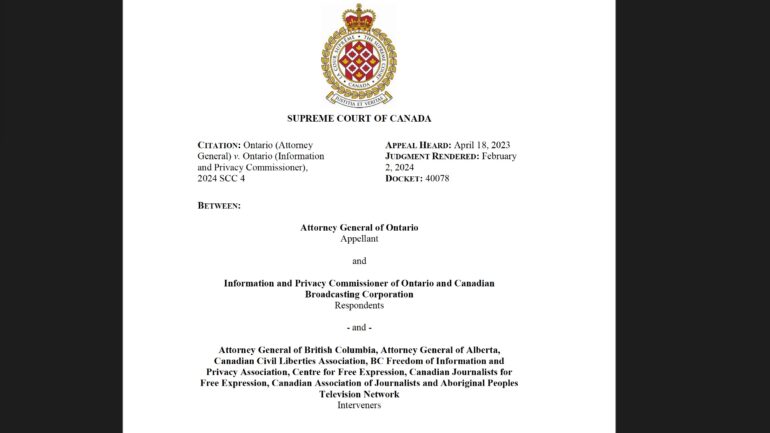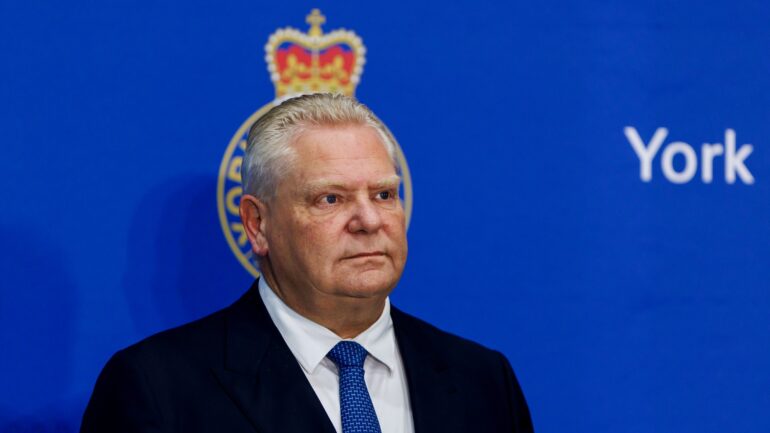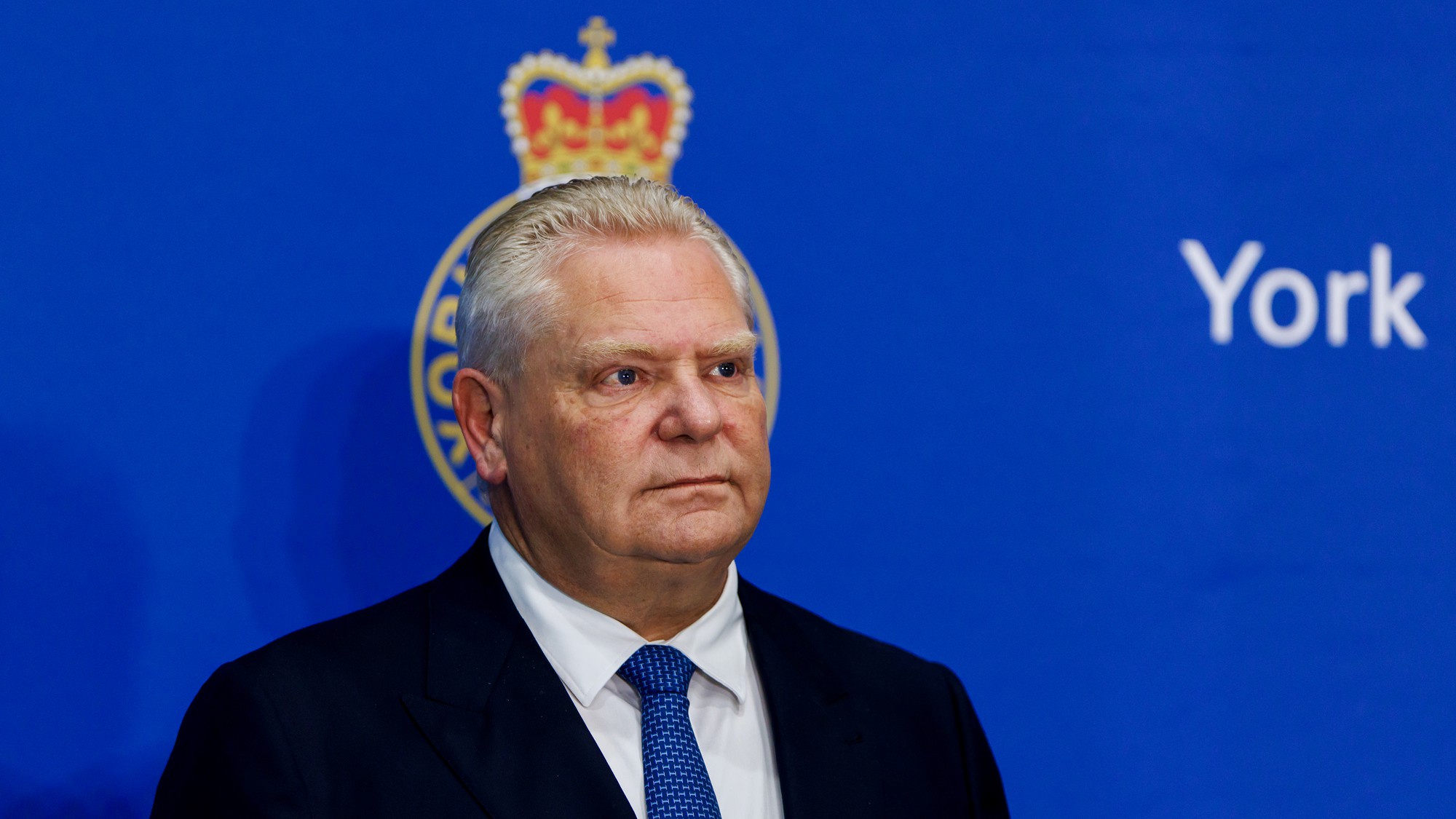The Supreme Court of Canada reinstated the confidentiality of the Doug Ford government’s 2018 mandate letters last Friday.
Opposition leaders say the ruling is a blow to government transparency.
Mandate letters were given by Premier Doug Ford outlining the goals and objectives for the 23 ministers in cabinet.
The Feb. 2 ruling put an end to the long legal battle between the Ford government and the CBC, after a journalist filed a freedom of information request (FOI) for the letters.

Screenshot of the first page of Supreme Court's judgement/ruling document about Doug Ford's mandate letters. Photo credit: SCC
The panel of seven judges unanimously decided the Ford government’s mandate letters are protected from disclosure under section 12(1) of the Freedom of Information and Protection of Privacy Act (FIPPA).
The section exempts records that would reveal the “deliberations” of Cabinet or its committees.
The judgment by the Supreme Court stated ministers must be able to deliberate freely, without fear of public scrutiny.
“Cabinet secrecy derives from the collective dimension of ministerial responsibility,” the ruling stated.
A CBC journalist made a freedom of information request (FOI) in 2018 for access to the Ford government’s 23 cabinet mandate letters.
In response to the FOI, the Ontario government refused to share the letters stating that they contained “substance of deliberations,” citing section 12(1) of Ontario’s FIPPA.
The CBC appealed to the Information and Privacy Commissioner of Ontario (IPC), supporting the media outlet. What followed were a string of appeals through Ontario courts. A majority of the Ontario Court of Appeal upheld IPC’s decision, the letters were not exempt and ordered their disclosure.
But the upper court quashed IPC’s and the appellate court’s interpretation, ruling the letters are exempt from disclosure.
“Freedom of information (FOI) legislation strikes a balance between the public’s need to know and the confidentiality the executive requires to govern effectively,” Justice Andromache Karakatsanis said in the unanimous decision.
“Both are crucial to the proper functioning of our democracy. This appeal concerns the balance between these two foundational principles,” Justice Karakatsanis said.
The judgment stated the cabinet decides when to announce their decisions.
The timing of cabinet announcements is based on any “harmful impact that premature disclosure of policy priorities can have on the deliberative process,” Justice Karakatsanis ruled.
“The efficiency of the deliberative process justifies keeping Cabinet proceedings confidential until a final decision is made and announced,” she ruled.
Ontario Premier Doug Ford attends a press conference at the York Regional Police Headquarters in Aurora, Ont., Wednesday, Jan. 31, 2024. Photo credit: pexels
CBC spokesperson Kerry Kelly said the organization appreciates the clarity on the law now, however it is disappointed by the decision.
“We believe the media’s coverage of the Ontario Greenbelt controversy, which included information the provincial government sought to keep private, illustrates the high public value of transparency and open access to information,” Kelly said.
The Office of the IPC of Ontario, in a written statement to Humber News, said it respects the Supreme Court’s decision.
“(We) will be considering the significance of this precedent and its broader implications for future cases involving access to cabinet records,” the Office of the IPC said.
NDP Leader Marit Stiles said the Ford government has wasted five years and a huge amount of taxpayers’ money by taking this to the Supreme Court.
“Mr. Ford and the Conservatives feel that they do not owe the people of Ontario any transparency or accountability for their sketchy backroom decisions,” Stiles said.
Mike Schreiner, leader of the Green Party of Ontario, said the Supreme Court’s ruling is disappointing. He said it has set a poor precedent for democracy in Ontario.
“Through multiple scandals and investigations, we have seen the lengths this government will go to conceal its bad behaviour from the people of Ontario,” Schreiner said.
Jeffery Dvorkin, senior fellow at Massey College and former director of journalism programs at the University of Toronto, said the ruling has put a different set of obligations on journalists.
He said journalists will have to find other sources of information to report on a story.
“We’re entering into a period of weaker media organizations, political parties and governments that don’t have the same level of respect for journalism that they once did,” Dvorkin said.
He said this ruling creates an ethical dilemma for journalists.
“Both sides have an important moral position, whether it’s the Supreme Court or the media culture, they both have legitimacy. But they are in conflict,” Dvorkin said.
Ontario Liberal Leader Bonnie Crombie said the public deserves to know what the premier instructs his ministers to do.
“If this government were truly ‘for the people,’ this would include being for the people’s right to know what their government is doing,” Crombie said.

